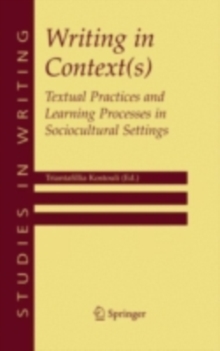
Teaching Academic Writing in European Higher Education PDF
Edited by Lennart Bjork, Gerd Brauer, L. Rienecker, Peter Stray Jorgensen
Part of the Studies in Writing series
Description
DAVID R. RUSSELL English Department of Iowa State University, U.
S. A. I was fortunate to attend, as a visitor from the U. S. , the first European Association for the Teaching of Academic Writing (EATAW) conference in 2001 at Groningen.
I was struck by the similarities in the challenges higher education faces on both sides of the Atlantic in terms of developing students' academic writing, and students' learning through writing.
It is indeed an international 'problem. ' But I was equally struck by the profound differences in responding to these challenges - among - tions, institutions, disciplines, and even within disciplines.
The essays in this - traordinary volume address a growing demand for help with academic writing, on the part of students and academic staff alike. And they do so in ways that bring fresh approaches, not only to Europeans, who have only recently begun to study academic writing, but also to researchers and academic staff in the U.
S. , where we have a c- tury-old tradition of attention to the problem - but are much in need of these fresh approaches.
Academic writing has become a 'problem' in higher education - all around the world - because higher education sits smack between two contradictory pressures.
On one end, far more students (and far more diverse students) come streaming into higher education - bringing in a far greater diversity of linguistic resources (often interpreted as 'standards are falling,' as Frank, Haacke & Tente point out).
Information
-
Download - Immediately Available
- Format:PDF
- Publisher:Springer Netherlands
- Publication Date:30/12/2005
- Category:
- ISBN:9780306481956
Information
-
Download - Immediately Available
- Format:PDF
- Publisher:Springer Netherlands
- Publication Date:30/12/2005
- Category:
- ISBN:9780306481956










